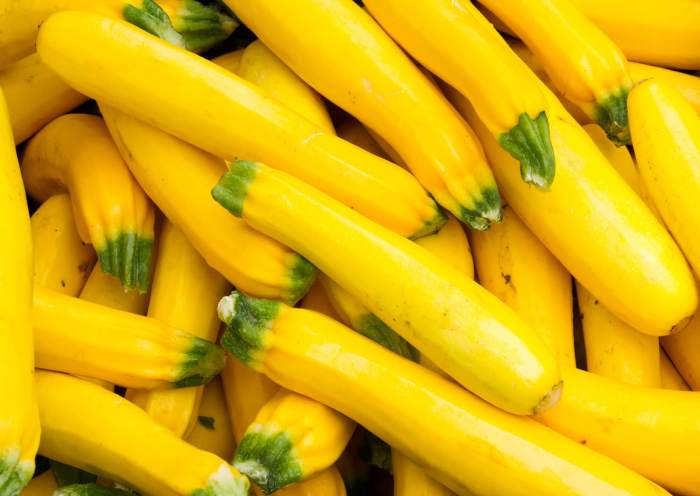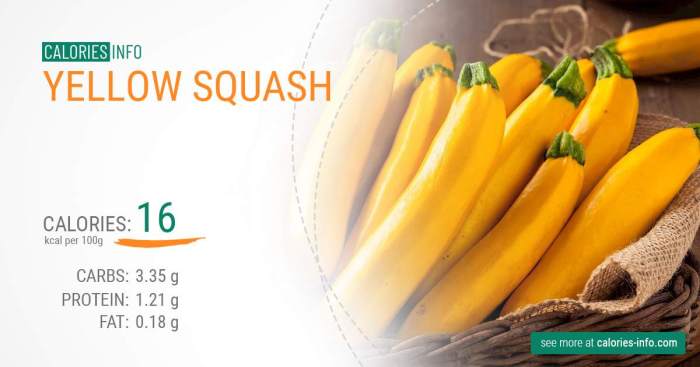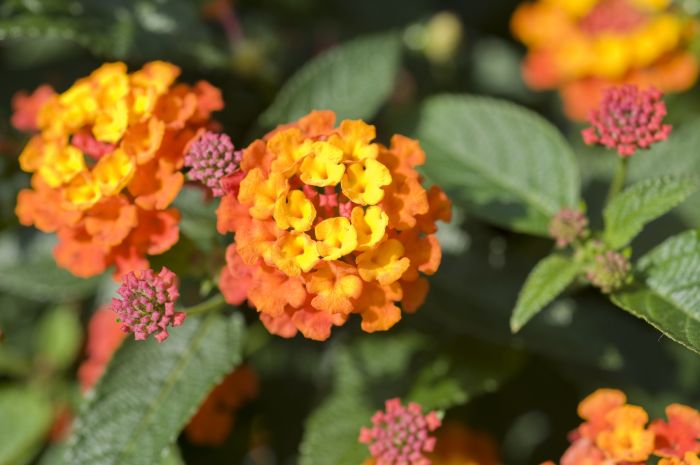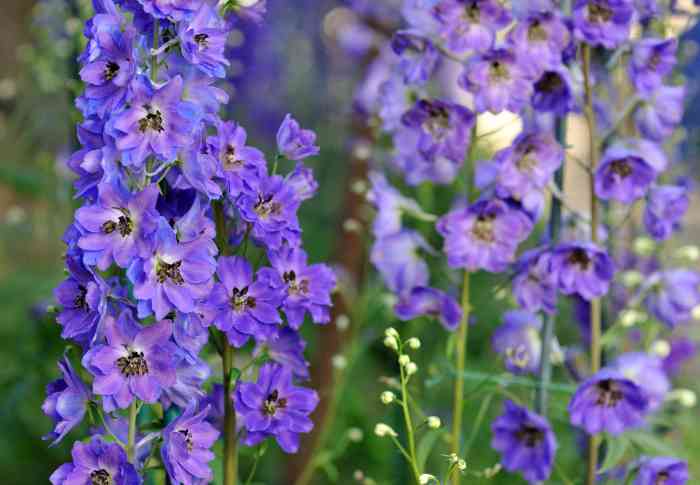Nutritional Profile of Yellow Squash

Yellow squash nutrition facts – Yellow squash, a summer squash variety, is a nutritional powerhouse packed with vitamins, minerals, and fiber, all while being remarkably low in calories. Its vibrant yellow color hints at its rich vitamin A content, while its mild flavor makes it a versatile addition to countless dishes. Let’s delve into the detailed nutritional breakdown of this healthy vegetable.
Macronutrient Composition of Yellow Squash
The macronutrient profile of yellow squash provides a balanced contribution to your daily intake. Below is a detailed breakdown of the carbohydrates, protein, and fat content per 100g serving. These values are approximate and may vary slightly depending on growing conditions and preparation methods.
| Nutrient | Amount (grams) | Amount (% Daily Value) | Unit |
|---|---|---|---|
| Carbohydrates | 3.5 | ~1 | g |
| Protein | 1.0 | ~2 | g |
| Fat | 0.3 | ~0.5 | g |
Vitamin and Mineral Content of Yellow Squash
Yellow squash is an excellent source of several essential vitamins and minerals crucial for maintaining optimal health. The following list highlights some of its key nutritional components. Note that the percentages of daily value can vary depending on individual needs and overall diet.
Yo, so yellow squash, right? Low-cal, packed with vitamin C – a real kampung champion! But if you’re looking for a whole-grain boost to your diet, check out the nutritional breakdown at ezekiel bread nutrition facts – it’s like, the Rolls Royce of bread. Then, after that carb-load, you can still enjoy more of that yummy, healthy yellow squash – it’s a win-win, my friend!
- Vitamin C: A potent antioxidant that supports immune function and collagen production. Yellow squash provides a significant amount, contributing to the daily recommended intake.
- Vitamin A: Essential for vision, immune function, and cell growth. The beta-carotene in yellow squash converts to Vitamin A in the body.
- Potassium: An important electrolyte that helps regulate blood pressure and fluid balance. Yellow squash is a good source of potassium.
- Manganese: A mineral involved in bone health, wound healing, and metabolism. Yellow squash contributes to the daily manganese requirement.
Fiber Content and Digestive Health
Yellow squash is a good source of dietary fiber, primarily in the form of insoluble fiber. Insoluble fiber adds bulk to the stool, promoting regularity and preventing constipation. It also helps to maintain a healthy gut microbiome by feeding beneficial bacteria in the intestines. Adequate fiber intake is essential for overall digestive health and can contribute to feeling full and satisfied, aiding in weight management.
A 100g serving of yellow squash provides a noticeable amount of this crucial dietary element.
Health Benefits of Yellow Squash Consumption: Yellow Squash Nutrition Facts

Yellow squash, a vibrant and versatile summer vegetable, offers a surprising array of health benefits beyond its delicious taste. Its nutritional profile contributes to various aspects of well-being, making it a valuable addition to a balanced diet. From aiding in weight management to providing a boost of antioxidants, yellow squash plays a significant role in promoting overall health.Yellow squash is a nutritional powerhouse that supports weight management efforts.
Its low calorie density, meaning it provides a relatively small number of calories per unit of volume, makes it a filling and satisfying food without contributing excessive calories to your diet. Coupled with its high fiber content, yellow squash promotes satiety, helping you feel full for longer periods and reducing the likelihood of overeating. The fiber also aids in healthy digestion and can help regulate blood sugar levels, preventing energy crashes and promoting sustained energy throughout the day.
Antioxidant Properties of Yellow Squash, Yellow squash nutrition facts
Yellow squash is a good source of various antioxidants, including carotenoids like beta-carotene and lutein. These powerful compounds combat free radicals, unstable molecules that can damage cells and contribute to the development of chronic diseases. Beta-carotene, a precursor to vitamin A, is essential for maintaining healthy vision, supporting immune function, and promoting healthy skin. Lutein, on the other hand, is particularly beneficial for eye health, playing a crucial role in protecting against age-related macular degeneration and cataracts.
By incorporating yellow squash into your diet, you can bolster your body’s natural defense mechanisms against oxidative stress and reduce the risk of various health problems.
Nutritional Comparison: Yellow Squash vs. Zucchini
While both yellow squash and zucchini belong to the same family of summer squash, there are subtle differences in their nutritional profiles. These differences, though minor, can influence their suitability for specific dietary needs and preferences.
The following points highlight key distinctions between the nutritional value of yellow squash and zucchini:
- Vitamin A: Yellow squash generally contains higher levels of beta-carotene, a precursor to vitamin A, compared to zucchini. This translates to a greater contribution to overall vitamin A intake.
- Color and Carotenoid Content: The vibrant yellow color of yellow squash reflects its higher concentration of carotenoids, including beta-carotene and lutein, compared to the darker green of zucchini. This difference in color indicates a variation in the types and amounts of beneficial phytonutrients.
- Taste and Texture: While both have a mild flavor, yellow squash often possesses a slightly sweeter taste and a denser texture than zucchini. These subtle differences can impact culinary applications and personal preferences.
- Nutrient Density: While both are low in calories and rich in fiber, the specific vitamin and mineral content may vary slightly depending on growing conditions and cultivar. However, both remain excellent sources of essential nutrients.
FAQ Overview
Is yellow squash good for weight loss?
Yes! Its low calorie and high fiber content promote satiety, helping you feel fuller for longer and potentially aiding in weight management.
Can I eat yellow squash raw?
Absolutely! Raw yellow squash offers a refreshing crunch and retains most of its nutrients. However, many prefer it cooked for a softer texture.
How long can I store yellow squash?
Store yellow squash in the refrigerator, unwashed, in a plastic bag. It should last for about 3-5 days.
Are there any potential downsides to eating too much yellow squash?
While generally safe, consuming extremely large quantities could lead to digestive upset due to its high fiber content. Moderation is key.



